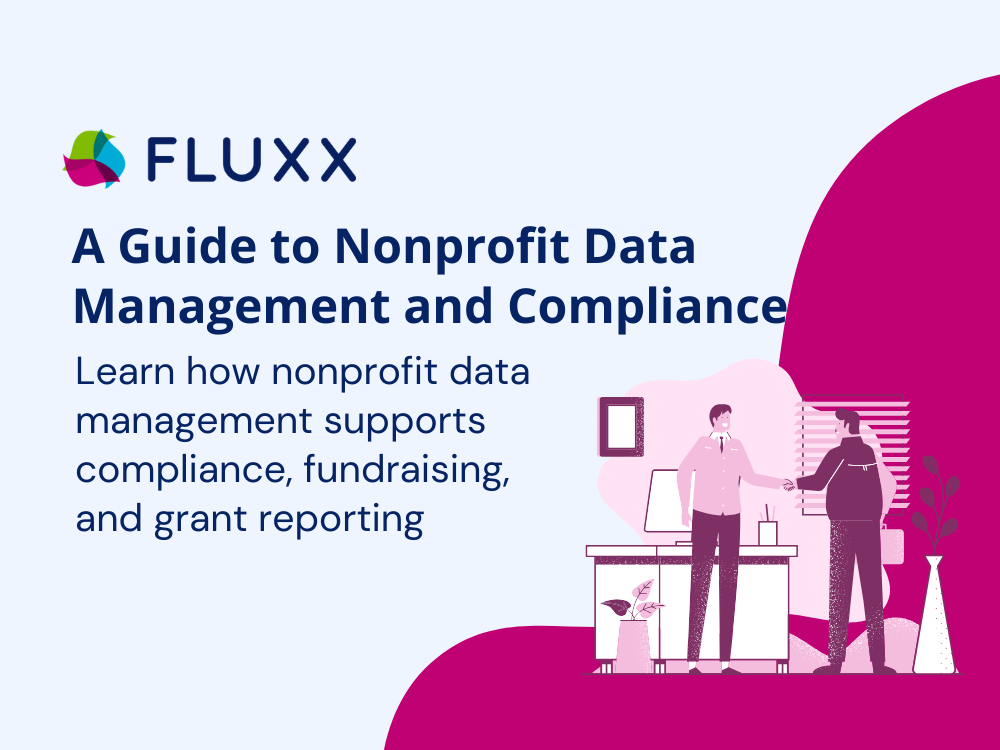What is a Formula Grant?
Explore what a formula grant is, how it works, and how to manage it effectively. Learn how formula grants compare to other types of grants and how...
Be the first to know about new Fluxx grants management resources, blog articles and podcasts.


With today's more digital and data-driven world, nonprofits have both opportunity and obligation: to make data effective, and to make it with integrity and in compliance. From program outcomes and donor data to grant tracking and impact monitoring, data is the key to mission success.
Nonprofit data management is not simply an IT problem, but a strategy that carries significant consequences for transparency, decision making, funding outcomes, and sustainability in the long term. In this blog, we're going to demystify nonprofit data management, the data that must be tracked, compliance considerations, and how Fluxx fits within an intelligent, secure software stack.
Nonprofit data management is the practice of collecting, organizing, securing, analyzing, and maintaining data related to an organization’s operations and impact. This includes everything from donor profiles and grant outcomes to beneficiary information and financial records.
Nonprofit data management systems help nonprofits centralize data, design workflows for compliance, automate reports, and facilitate interdepartmental collaboration, for instance, between fundraising, programs, and finance teams.
It typically involves:
Nonprofit information is no longer just a back-office problem—it’s center stage in operational efficiency, strategy development, and organizational accountability. Now that more funders and stakeholders are demanding real-time access to outcomes and financials, nonprofits must leap from reactive to proactive data management.
Good data management has a direct effect on whether or not an organization can raise money, manage risk, and deliver results. When data is decentralized and inconsistent, data is in silos, leading to inefficiency, incomplete reports, missed deadlines, or even non-compliance. By keeping data organized, easily accessible, and credible, nonprofits make decisions more quickly, report impact more clearly, and get teams in line across functions.
Whether you are preparing for an audit, compiling a report for a grantor, or tracking long-range program results, strong data infrastructure serves your mission with clarity, confidence, and compliance.
Nonprofits generate a vast amount of data every day—from simple contact forms to complex grant reporting metrics. Managing this information effectively requires an understanding of what’s being captured and why it matters. Different departments and stakeholders rely on different types of data, and each must be tracked, stored, and governed accordingly.
These are the most crucial data types that nonprofits must manage:
These categories, while having a distinct operational function, are also bound by compliance, reporting, and data protection mandates.
As data privacy laws evolve and funder expectations grow, nonprofits must proactively implement policies and systems that ensure full data compliance. This isn’t simply about avoiding fines—it’s about protecting the trust of donors, beneficiaries, and communities.
Compliance for nonprofits includes adhering to legal regulations such as GDPR, HIPAA, and state-level data privacy laws, as well as staying audit-ready for grant funders and financial oversight bodies. That means maintaining clean records, demonstrating transparency, and putting in place safeguards that ensure sensitive information is properly handled.
For organizations that manage government or foundation grants, compliance reaches into financial reporting, impact measurement, and performance monitoring as well. Not meeting these requirements can derail future funding prospects and undermine partner relationships. A deliberate compliance strategy, in conjunction with the appropriate tools, is now necessary for every mission-driven organization.
Nonprofit data management is more than about tools—it's about culture, discipline, and cross-functional alignment. These are the essential best practices to make your data work for your mission:
Health data culture doesn't happen overnight—but by committing to these habits over the long haul, your team decreases risk while unlocking latent capacity.
Fluxx sits at the intersection of nonprofit data, compliance, and strategic grants management. As a cloud-based solution designed for both grantmakers and grantseekers, Fluxx streamlines data-heavy tasks while ensuring every action aligns with funding requirements and mission goals.
With Fluxx, your nonprofit can:
Whether you have one grant or hundreds, Fluxx introduces order, simplicity, and compliance to every step of the grant life cycle—all while liberating your team to make a difference.
Because it does. Effective nonprofit data management isn’t a luxury, it’s a necessity. With growing demands for transparency, outcome tracking, and funder accountability, your data systems need to do more than store information—they must support action.
Platforms like Fluxx make it possible to simplify the complexity of data while ensuring you're fully compliant and fully prepared.
Are you ready to put control and clarity into your data strategy? Register now for a demo today and see how Fluxx can help you confidently manage your nonprofit data.
Explore what a formula grant is, how it works, and how to manage it effectively. Learn how formula grants compare to other types of grants and how...
Learn how corporate giving works, how it differs from traditional grants, and how to manage it efficiently with software like Fluxx for better...
Discover how government management software works, how it differs from grant management tools, and how platforms like Fluxx help agencies run more...
Be the first to know about new Fluxx grants management resources, blog articles and podcasts.